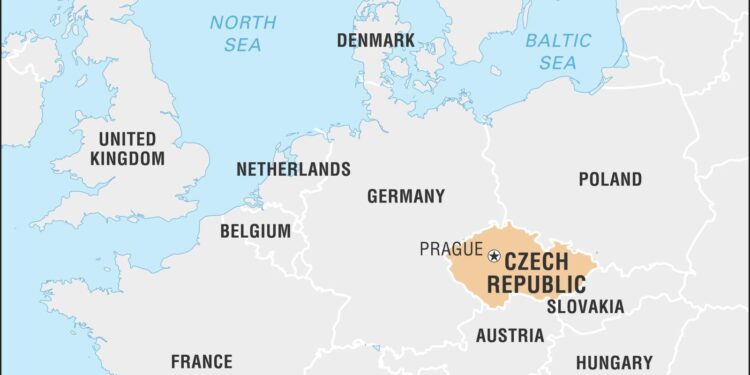The Czech Republic has announced plans to expel a Belarusian diplomat amid allegations of espionage, escalating tensions between the two countries. The move comes as Prague accuses the diplomat of engaging in intelligence activities incompatible with their diplomatic status. This development marks a significant diplomatic rift and underscores growing concerns over Belarusian espionage operations within Europe. Further details about the case and the diplomatic fallout are expected as the situation unfolds.
Czech Republic Expels Belarusian Diplomat Amid Espionage Allegations
The Czech government has announced the removal of a Belarusian diplomat following suspicions of espionage activities within its borders. Authorities assert that evidence points to covert operations aimed at gathering sensitive information, potentially threatening national security. This decisive move underscores Prague’s growing vigilance against foreign intelligence threats, particularly from neighboring states with a history of strained diplomatic relations.
Key details of the case include:
- The diplomat was officially declared persona non grata and given 72 hours to leave the country.
- Local security services have intensified monitoring of Belarus-affiliated entities in the region.
- The expulsion reflects coordinated efforts with EU partners concerned about espionage in Eastern Europe.
| Aspect | Details |
|---|---|
| Diplomat’s Role | Second Secretary at Belarus Embassy |
| Espionage Allegation | Collecting classified government data |
| Response | Expulsion and diplomatic protest |
| Impact on Relations | Heightened tensions between Czech Republic and Belarus |
Implications for Bilateral Relations and Regional Security Dynamics
The decision by the Czech Republic to expel a Belarusian diplomat over espionage allegations marks a significant turning point in bilateral relations. This move deepens the fissures between Prague and Minsk, intensifying an already fragile diplomatic landscape. Trust between the two nations is likely to erode further, impacting cooperation on matters such as trade and migration. The expulsion sends a strong message that the Czech government is willing to take assertive action against intelligence threats, signaling a zero-tolerance stance on covert activities within its borders.
Beyond bilateral ties, the incident adds another layer of complexity to regional security in Eastern Europe. The move may exacerbate tensions within the broader European context, where concerns over espionage and influence operations are already high. Analysts suggest this could trigger:
- Heightened vigilance among neighboring states wary of Belarusian intelligence maneuvers.
- Strengthened intelligence cooperation between EU and NATO members to counteract espionage threats.
- Increased diplomatic strain between Belarus and Western-aligned countries, potentially influencing regional alliances.
| Aspect | Potential Impact |
|---|---|
| Diplomatic Trust | Severe deterioration |
| Regional Intelligence Sharing | Increase and coordination |
| Belarus-EU Relations | Further deterioration |
| Security Environment | More volatile and cautious |
Recommendations for Strengthening Counterintelligence Measures and Diplomatic Protocols
In the wake of heightened espionage concerns, it is imperative that the Czech Republic undertakes a comprehensive review and reinforcement of its counterintelligence frameworks. Authorities should prioritize enhanced surveillance protocols and the incorporation of advanced digital monitoring tools to detect and thwart clandestine operations more effectively. Collaboration between domestic intelligence agencies and international allies must be deepened to facilitate real-time intelligence sharing, ensuring swift responses to emerging threats.
Simultaneously, diplomatic missions require stricter oversight without compromising the principles of international relations. Recommended actions include:
- Regular vetting and background checks of diplomatic staff.
- Implementation of clear guidelines for the conduct and movement of foreign diplomats.
- Mandatory counterintelligence training for protocol officers and embassy personnel.
- Establishment of a dedicated unit tasked with monitoring suspicious activities within diplomatic circles.
| Measure | Expected Impact |
|---|---|
| Advanced Digital Surveillance | Improved detection of espionage attempts |
| International Intelligence Sharing | Faster threat identification and response |
| Diplomatic Staff Vetting | Reduced insider risks |
| Counterintelligence Training | Heightened awareness among officials |
Wrapping Up
The Czech Republic’s decision to expel a Belarusian diplomat amid allegations of espionage marks a significant escalation in tensions between the two countries. As Prague takes a firm stance on safeguarding its national security, the move is likely to reverberate through diplomatic channels and further strain Belarus’s relations with the European Union. The situation remains fluid, with both sides expected to respond in the coming days. The Star will continue to monitor developments and provide updates on this evolving story.
















